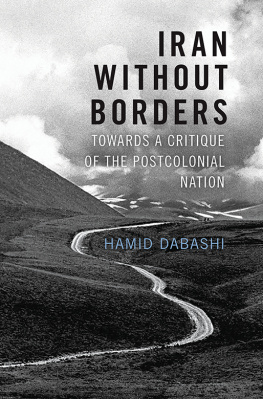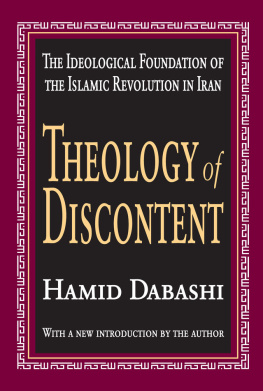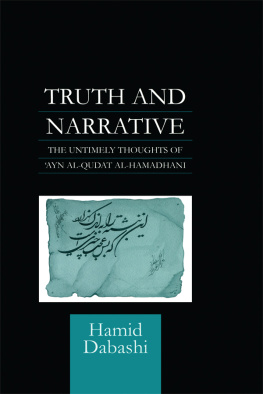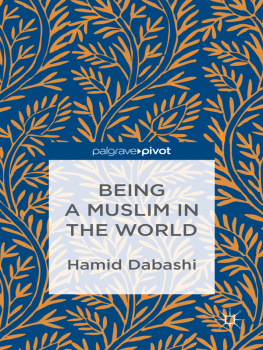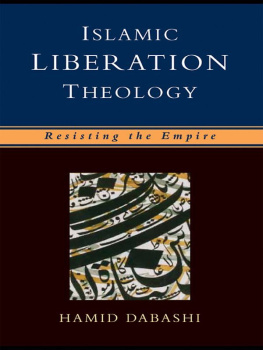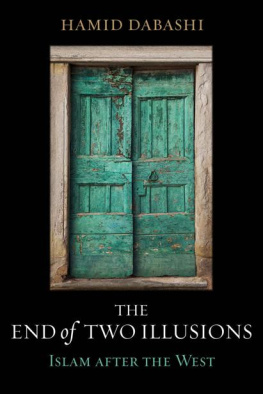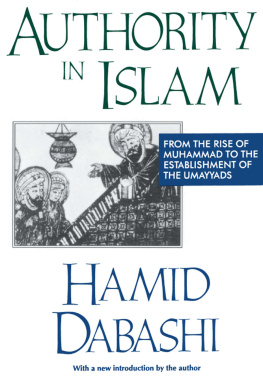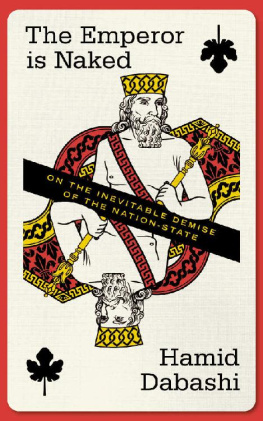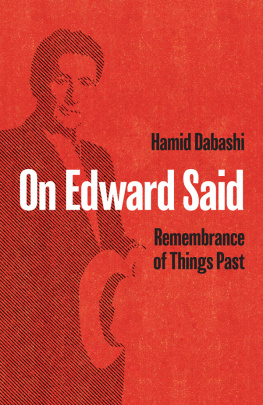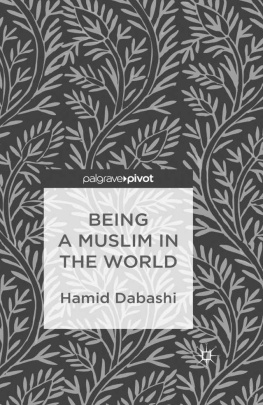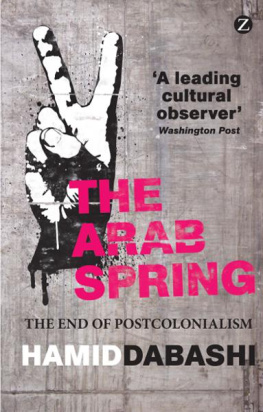Iran Without Borders
Towards a Critique of the
Postcolonial Nation
HAMID DABASHI

First published by Verso 2016
Hamid Dabashi 2016
): Flood Gallery Fine Art Center Collection, Asheville, NC; from Hamid Dabashi, In Search of Lost Causes: Fragmented Allegories of an Iranian Revolution (Asheville, NC: Black Mountain Press, 2013). Reprinted with the kind permission of the publisher.
): Nicky Nodjoumi, Caught on the Way (200809), oil on canvas, 96 in. x 120 in. Courtesy of the artist and Taymour Grahne Gallery, New York.
): Slavs and Tatars, Molla Nasreddin: The Magazine that Wouldve Couldve Shouldve (Bruges: Christoph Keller Editions, 2011).
): Azadeh Akhlaghi, Sohrab Shahid-Saless1 July 1998Chicago (2012Print on Photo Paper9 Editions + 1AP247 cm 110 cm). From By an Eyewitness (series). Reprinted with the kind permission of Azadeh Akhlaghi.
.
): Reprinted with the kind permission of Amir Naderi.
All rights reserved
The moral rights of the author have been asserted
1 3 5 7 9 10 8 6 4 2
Verso
UK: 6 Meard Street, London W1F 0EG
US: 20 Jay Street, Suite 1010, Brooklyn, NY 11201
versobooks.com
Verso is the imprint of New Left Books
ISBN-13: 978-1-78478-068-5 (HB)
ISBN-13: 978-1-78478-069-2 (US EBK)
ISBN-13: 978-1-78478-070-8 (UK EBK)
British Library Cataloguing in Publication Data
A catalogue record for this book is available from the British Library
Library of Congress Cataloging-in-Publication Data
Names: Dabashi, Hamid, 1951- author.
Title: Iran without borders : towards a critique of the postcolonial nation / Hamid Dabashi.
Description: Brooklyn, NY : Verso, 2016.
Identifiers: LCCN 2016008724 | ISBN 9781784780685 (hardback)
Subjects: LCSH: IranCivilization. | IranIntellectual life. | BISAC: HISTORY / Middle East / General.
Classification: LCC DS266 .D238 2016 | DDC 955--dc23
LC record available at http://lccn.loc.gov/2016008724
Typeset in Sabon by MJ&N Gavan, Truro, Cornwall
Printed in the US by Maple Press
For
Alejandra Gmez Colorado
and
Moiss Garduo Garca
Iranians beyond borders
Contents
I succeeded:
I registered myself
I adorned my name
Within an Identity Card,
And now my existence
Has a number:
Thus Hooray and Long Live Number 678
Issued from the Fifth District
Residence of Tehran!
Now I am totally at ease:
The kind bosom of the Motherland,
The pacifier of the Glorious Historical Heritage,
The lullaby of Civilization and Culture,
And all the jingling of the jingle bells of Law!
Forough Farrokhzad,
Oh Bejeweled Land (1964)
My father, Khodadad Dabashi, worked for the railroad. In Ahvaz, where I was born and raised, the Iranian national railroadextending from Khorramshahr in the south to Tehran in the north and then turned east to Mashhad in the northeastern province of Khorasanhad a major station, where my father worked since before I was born, in mid June 1951, until his death in the summer of 1970. He made a meager but steady salary which, upon receipt, he handed entirely to my mother, who would immediately give him his monthly stipend for his one bottle of Russian vodka and one pack of cigarettes. The supply would ordinarily last him only three weeks of the month, during which he was a staunch anticolonial nationalist. But on the first day of the fourth week of the month when he ran out of his vodka and cigarette supply, signs of his ardent Nasserite socialism began to appear, building to a crescendo before his next paycheck and stipend about a week later, when once again Mosaddegh would resurface and Nasser subside.
I grew up in a household that was entirely matriarchal in its nature and disposition. My mother, Zahra Parviz Motlaq (Dabashi) was the boss. What she said, we all did. My father was the cook. He would come home from work, immediately report to our small kitchen, turn on his radio to Basra station, start listening to the legendary Egyptian singer Umm Kalthum, pour himself a shot of his vodka, light his cigarette, and begin cooking for us. His anticolonial nationalism and Third World socialism dovetailed somewhat miraculously with my mothers Shii piety. She never drank (except on very rare nocturnal occasions with my dad, when she thought my younger brother Aziz and I were asleep). She prayed fastidiously five times a day, fasted during the month of Ramadan, and led us in pilgrimage to Qom and Mashhad with the free train tickets my father received as part of his benefits. My father never prayed or fastedexcept one summer when we were in Qom, when suddenly he stood up and prayed for about an hour, for the entire duration of which my mother could not stop laughing.
There was a blind Mollawe called him Molla Javadwho was among the regular retinue of my mothers Shii piety. Molla Javad would come to our home once a month, initially to answer my mothers juridical questions and concernsranging from the proper ritual purity mandates of a Muslim woman, to laws of alms and religious taxes. This would usually last about ten to fifteen minutes. Then he would start chanting songs (rozeh-khani, as we say in Persian) in praise of Imam Hossein and his seventy-two valiant supporters in the famous Battle of Karbala in the year 680 of the Common Erathe most sacrosanct traumatic event on the Shii calendar. My mother took advantage of Molla Javads blindness, quietly attending to her household chores while asking him her juridical concerns. But when he began singing in praise of Seyyed al-Shohada my mother sat down in our living room and cried for a few minutes. When the rozeh was over, she quietly returned to her chores and Molla Javad began addressing me, my younger brother Aziz, and my cousin Hossein (if he happened to be there)alternating between warning us against the sinful hazards of masturbation and teaching us about the virtues of Ayatollah Khomeini and his revolutionary zeal.
If the day that Molla Javad had come to our home for his monthly ritual happened to be a Friday, soon after his preaching he would get into an argument with my fatherand the nature of their political debate entirely depended on whether my father was in his (first three weeks of the month) anticolonial nationalist mood, or (final week of the month) socialist mood. Either way, a heated discussion would ensue, Molla Javad would denounce both Mosaddegh and Nasser, and praise Ayatollah Khomeini, as my father quietly sipped his vodka, puffed on his cigarette, and found a judicious way to concur with Molla Javad on one thing: that the British were bastards.
In between my fathers alternating anticolonial nationalism and Third World socialism, on one side, and Molla Javads militant Islamism, competing for the gracious, patient, and quiet gaze of my mothers Shii pietism, the spectrum of my childhoods politics was extended into my adult life as I left my hometown for Tehran to go to college. In the mid 1970s I left Iran altogether for the United States, and watched the unfolding of the Iranian revolution of 197779 from afar. The socialist Tudeh Party was the most significant representation of Third World socialism in twentieth-century Iranian history, while Mohammad Mosaddeghs championing of the nationalization of the oil industry against British colonial domination exemplified the anticolonial nationalism of the same era. But Ayatollah Khomeinis militant Islamism ultimately outmaneuvered its rivals, stealing their thunder and triumphantly establishing an Islamic Republic in Iran.

